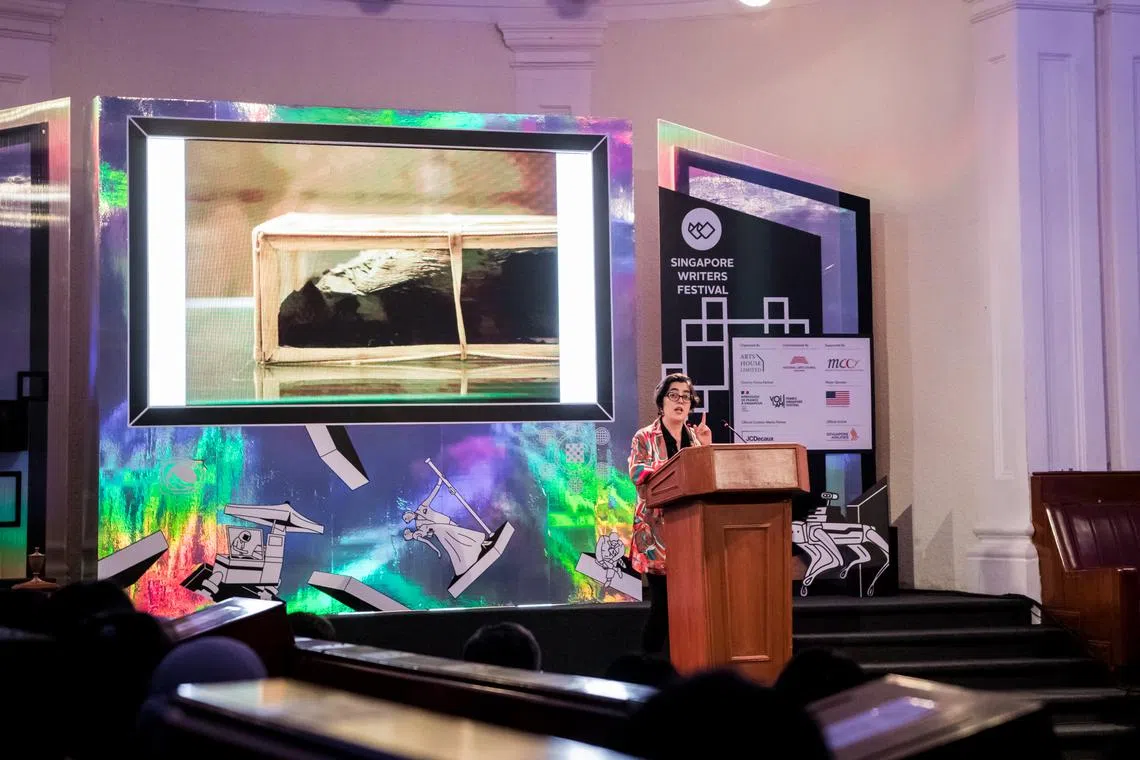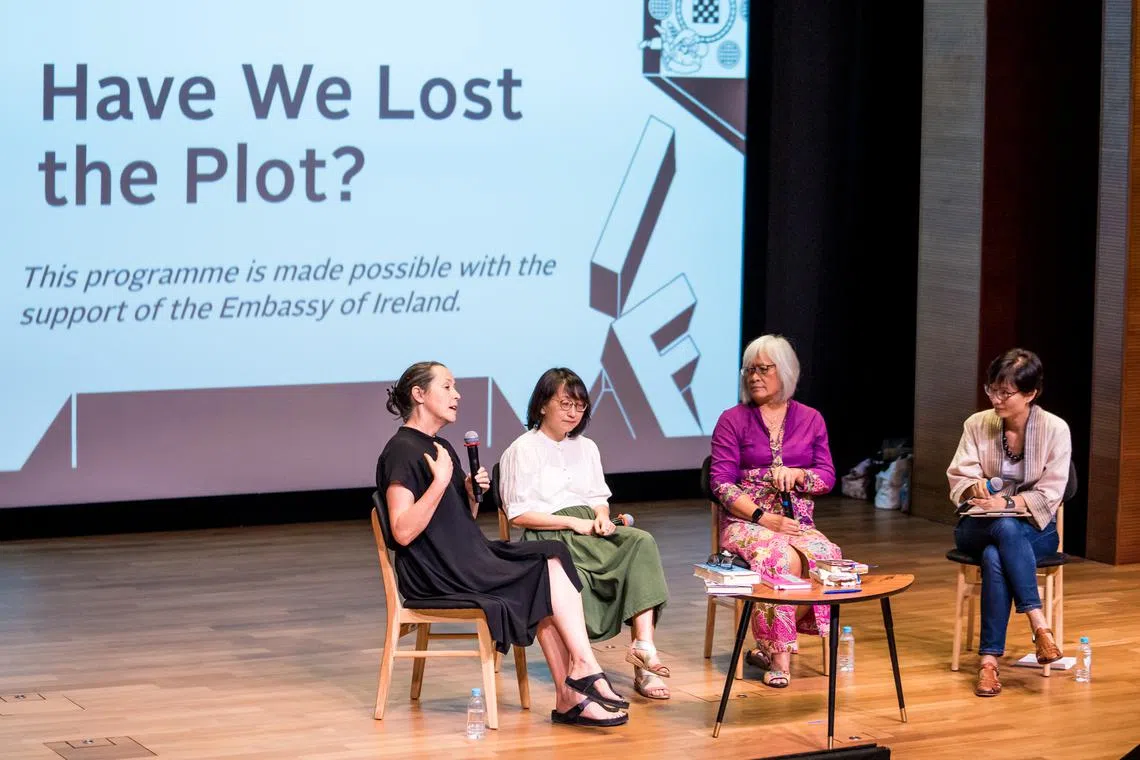Singapore Writers Festival: Burning books, losing the plot and posthuman realities
Sign up now: Get ST's newsletters delivered to your inbox

Shubigi Rao delivering her keynote talk, Text Is Thicker Than Water, at The Arts House.
PHOTO: ARTS HOUSE LIMITED
SINGAPORE – Book-burning and the gatekeeping of knowledge were some of the weighty topics explored in Shubigi Rao’s keynote speech at the Singapore Writers Festival on Sunday.
Rao, who represented Singapore at the 2022 Venice Biennale, is known for Pulp, a decade-long book, visual arts and video project on the destruction of books.
Her lecture, Text Is Thicker Than Water, covered plenty of ground – from the shelling of Sarajevo’s national library in the Bosnian War to the courageous efforts of Iraqi librarian Alia Muhammad Baker, who saved 30,000 books and manuscripts from the Al Basrah Central Library by smuggling them out during the Iraq War.
On the future of knowledge, Rao says: “Just because it is online doesn’t mean it is forever. A number of people have spoken about something called the digital dark age. The Internet is actually very fragile, and things disappear all the time.
“Everyone knows about the Library of Alexandria, but how about Library.nu? It had about 400,000 titles – some of them were very poor scans, some were orphaned books with no provenance... It was a huge place for all sorts of knowledge. All it took was a single court injunction, and the whole thing vanished overnight. That was equivalent to the burning of a library. We just don’t see it.”
Rao’s talk brimmed with insights, and readers looking to learn more would do well to leaf through Pulp I (2016) and Pulp II (2018), as well as Pulp III – the centrepiece of her Venice exhibition – when it is available in Singapore.
Over at the National Gallery Singapore, Irish novelist Audrey Magee and Singapore authors Yeo Wei Wei and Josephine Chia gathered for a lively panel discussion titled Have We Lost The Plot?.
Magee, author of The Undertaking (2014) and the Booker Prize-longlisted title The Colony (2022), used to work as a journalist. She covered the 1998 bombing in Omagh, Northern Ireland, and recalls sitting at a kitchen table in silence for 1½ hours with a relative of the victims.
“What is the most precious thing is the ordinary, the quotidian, the everyday”, she learnt that day.
She says: “Both my novels start off really slowly, because I’m trying to strip people back, to come on a trip into the quotidian.”
One highlight of the evening was A Little Less Human: Posthumanist Realities, which drew a full house of about 80 people to The Arts House’s Living Room. Many hopeful attendees were turned away at the door.
The session featured American poet Franny Choi; French poet Perrin Langda, who tuned in remotely; and Daryl Lim Wei Jie, whose collection Anything But Human (2021) was shortlisted for the Singapore Literature Prize.
They read from their poems, and then – in conversation with the moderator, poet Aaron Maniam – pondered topics ranging from the “I” in their poems to technologies such as artificial intelligence.

(From left) Audrey Magee, Yeo Wei Wei, Josephine Chia and moderator Bridgette See on the panel of Have We Lost The Plot? at the National Gallery Singapore.
PHOTO: ARTS HOUSE LIMITED
Asked by an audience member about the realities their poems emerged from, Lim says: “I think of the world as a trash heap.”
He adds that the world of Anything But Human is a rubbish dump – not just ecologically and physically, but also mentally – and the book is poised in a state of ambivalence towards this.
Reacting to that, Choi, author of The World Keeps Ending, And The World Goes On (2022), who was born in the United States to Korean immigrants, says: “I love that you say the book is (in a state of) ambivalence to the trash heap. I find myself reacting against it when people say... the robots are taking over, the robots are coming to take our jobs. That rhetoric is familiar to me, because that rhetoric is based on the rhetoric of ‘who is coming to take our jobs’, who is rising, who is looking to invade us. It’s always been a sort of ‘other’, and often a racialised ‘other’.
“For me, a posthuman reality comes from acknowledging the reality of who has already been made to feel less than human. It’s not about ‘ooh, wouldn’t it be fun if I were a robot’. It’s about approaching that reality of having been made into an object, a machine, a useful body, and approaching that with a kind of ambivalence that is interested in it, horrified by it, turned off by it, finding it funny. That complicated ball of emotional responses is, for me, where my best work comes from.”


